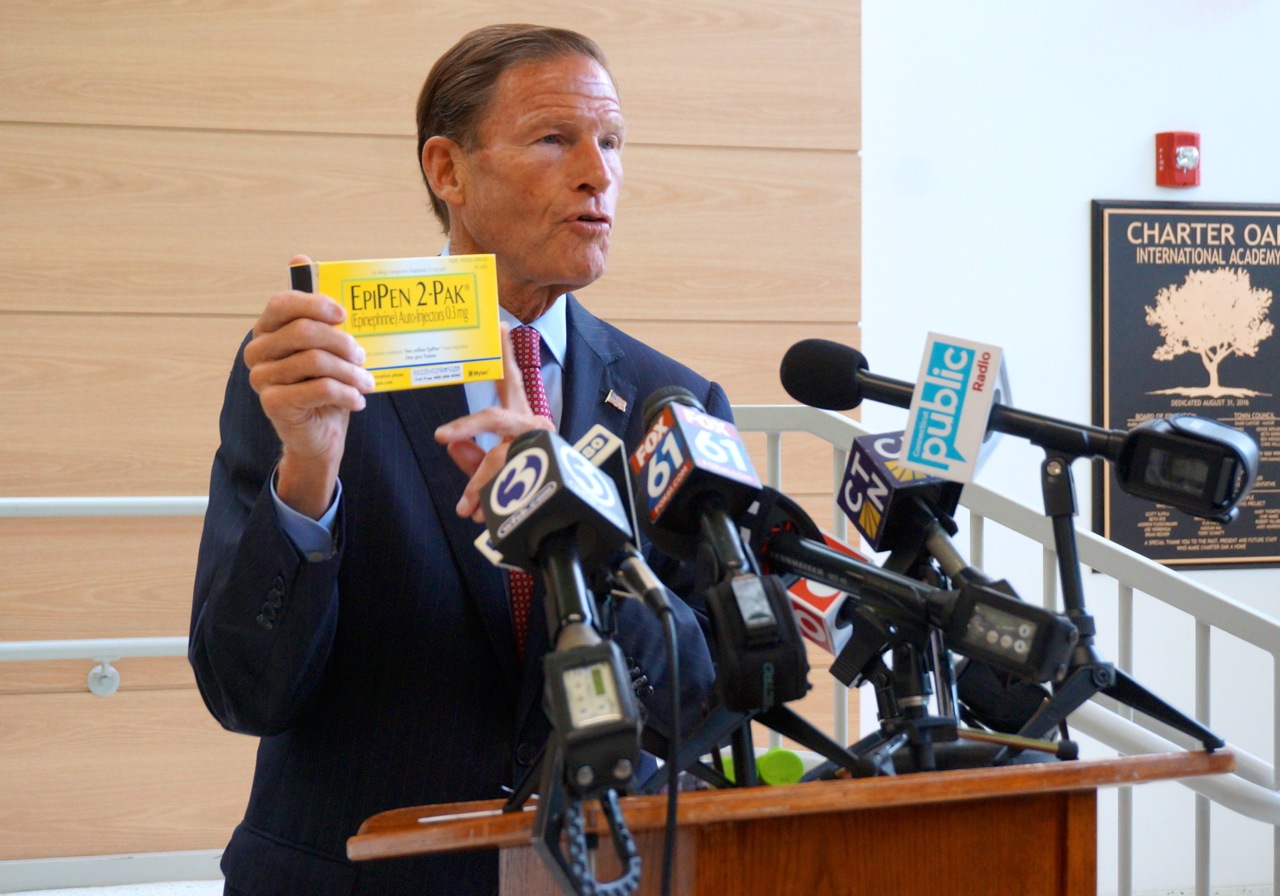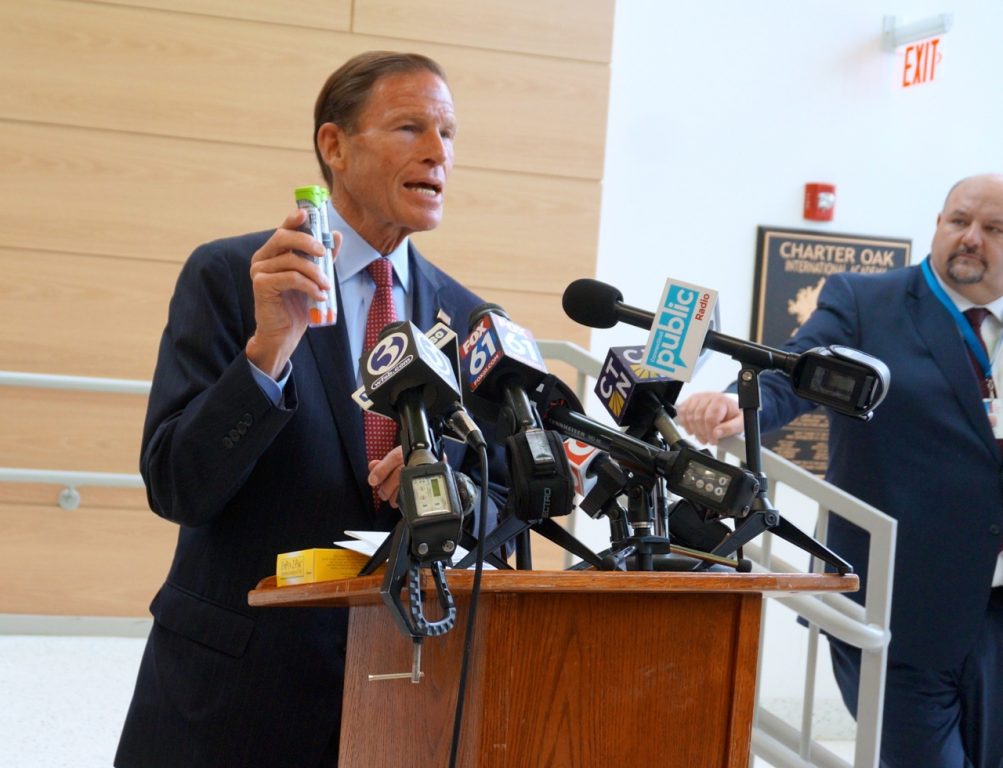At West Hartford Press Conference Sen. Blumenthal Unveils Action to Address EpiPen Costs and Shortages

Audio By Carbonatix

At a press conference in West Hartford, Sen. Richard Blumenthal holds up a package of EpiPens, which have skyrocketed in cost are in short supply. Photo credit: Ronni Newton
U.S. Sen. Richard Blumenthal was joined by West Hartford Superintendent of Schools Tom Moore, Mayor Shari Cantor, State Rep. Andy Fleischmann, and several others to discuss critical problems with the cost and shortage of life-saving EpiPens.

State Rep. Andy Fleischmann speaks at a press conference Monday about legislation he co-sponsored that in part allows students to carry EpiPens on buses and requires drivers to be trained to administer them. At right is Sen. Richard Blumenthal. Photo credit: Ronni Newton
By Ronni Newton
Epinephrine is a workhorse drug that has been in existence for decades, yet in the current marketplace this life-saving drug is becoming cost-prohibitive, or even unavailable to those with severe food and other allergies.
As students return to school, many parents are scrambling to replace their children’s expiring EpiPens, and school districts are also looking to restock their supplies of the devices that have traditionally been marked with a shelf life of just one year.
“The reason for the skyrocketing prices is that [EpiPen manufacturer] Mylan has a monopoly,” Sen. Richard Blumenthal said at a press conference held at Charter Oak International Academy in West Hartford on Monday morning. The devices, which once sold for $57, are now $600-$700, if they can be found at all. Some parents are being forced to skimp, putting their children’s lives at risk by not replacing expired EpiPens, he said.
Blumenthal said he wrote to FDA Commissioner Scott Gottlieb in the spring, and was told that the shortage of EpiPens was temporary, but the shortages have persisted. And although a generic product has been approved, it has yet to reach the market, he said.
In a letter dated Aug. 27 to Health and Human Services Director Alex Azar, Blumenthal stated: “I write to you regarding the persistent, serious shortage of the widely used EpiPen Auto-Injector as we begin a new school year. As you know, this lifesaving drug provides treatment and security to millions of Americans, including children, who suffer from severe allergies. The prolonged shortage of EpiPen is simply unacceptable. I urge the Department of Health and Human Services (HHS) to work with insurers to help make available epinephrine auto-injectors, whether domestic or imported, so that children and families can access these lifesaving products as this unacceptable shortage persists.”
Blumenthal said he plans to introduce a bill, the “Cure High Drug Prices Act,” so that the Department of Justice and Department of Health and Human Services will have the power to take action if prices of drugs are abnormally high or rise by more than 10 percent without a valid reason. If passed, it would be the first federal price-gouging statute applied to drug pricing, he said.
Mylan has offered coupons and discounts on EpiPens, but even when applied the cost is still six times greater than it was in the recent past, Blumenthal said. “It’s completely unjustified except for profiteering of the drug company.”
One way the company has addressed the shortage is extending the expiration date of EpiPens by four months – “which should be a signal that it’s meaningless in the first place,” Blumenthal said. He’s angered that supplies of this critical have perhaps been being discarded for no reason other than profit, when at the same time there is a shortage. “The FDA needs to look at itself in the mirror,” said Blumenthal.
State Rep. Andy Fleischmann of West Hartford (D-18th), along with State Rep. Derek Slap (D-19th), sponsored Public Act 18-185, which was passed during the 2018 legislative session. The measure specifically permits children to carry EpiPens on school buses and self-administer the medication. Bus drivers are also being trained to be able to administer the drug to children who cannot self-administer – rather than losing valuable time while they call 9-1-1.
At Monday’s press conference, Fleischmann called Mylan’s actions cynical, manipulative, and difficult to fathom. “The manufacturer has responded to increased demand by jacking up the prices. This is not a free and fair market, this is a monopoly,” he said.
Dr. Eric Arlia, head of Pharmacology at Hartford Hospital, agreed that the price-gouging is the result of not enough competition. He said that the amount of epinephrine in an EpiPen costs only about a dollar, and the real cost is the administration device. Using epinephrine intravenously can be life-threatening, so even in a hospital setting they use the EpiPens for safety.
“It’s so important that we provide all of our students with security, well-being health, mental and physical, and this is so essential to part of that process,” West Hartford Mayor Shari Cantor said. Cantor said she’s seen firsthand the value and effectiveness of an EpiPen, when one of her son’s friends had an allergy attack while at her house.
West Hartford Superintendent of Schools Tom Moore also knows firsthand how important EpiPens are as a life-saving device. His son, now a college freshman, has life-threatening allergies to eggs, dairy, tree nuts, and peanuts, and at age 6 lobbied then-Senator Chris Dodd for the right to carry his EpiPen on the school bus.
“As a parent, I’m not letting him go anywhere without his EpiPen,” Moore said.
Moore expressed his thanks to Fleischmann and Blumenthal for the legislation that they have supported and actions they have taken to make EpiPens more available, as well as to stop price-gouging. Moore said he was lucky enough to be able to purchase new EpiPens before his son left for college, but “to see the bill for $1,400 was a little bit shocking.”
Carolyn Janis of Middlefield said at the press conference that her 4-year-old son Noah tells her, “I hate allergies, momma.” Just this morning she said she tried unsuccessfully to obtain a refill for his EpiPen, and without it, he won’t be allowed in school.
“We’re not talking here about an exotic, rare disease that’s recently discovered,” said Blumenthal. “We’re talking about a workhorse drug.” Only the federal government really has the authority to act, and he is hoping that there will be bipartisan support for this measure.
“It is a matter of life and death for kids when they have emergency reactions,” Blumenthal said.
Like what you see here? Click here to subscribe to We-Ha’s newsletter so you’ll always be in the know about what’s happening in West Hartford!

From left: Sen. Richard Blumenthal, Mayor Shari Cantor, Superintendent Tom Moore. Photo credit: Ronni Newton

At a press conference in West Hartford, Sen. Richard Blumenthal holds up a package of EpiPens, which have skyrocketed in cost are in short supply. Photo credit: Ronni Newton

Superintendent Tom Moore speaks of his own family’s experience with EpiPens at a press conference Monday in West Hartford. At right is Sen. Richard Blumenthal.

From left: Andy Fleischmann, Carolyn Janis, Eric Arlia, Richard Blumenthal. Photo credit: Ronni Newton




[…] children with life-threatening food allergies, students with special needs, and kids who might feel marginalized, the coming school year should […]